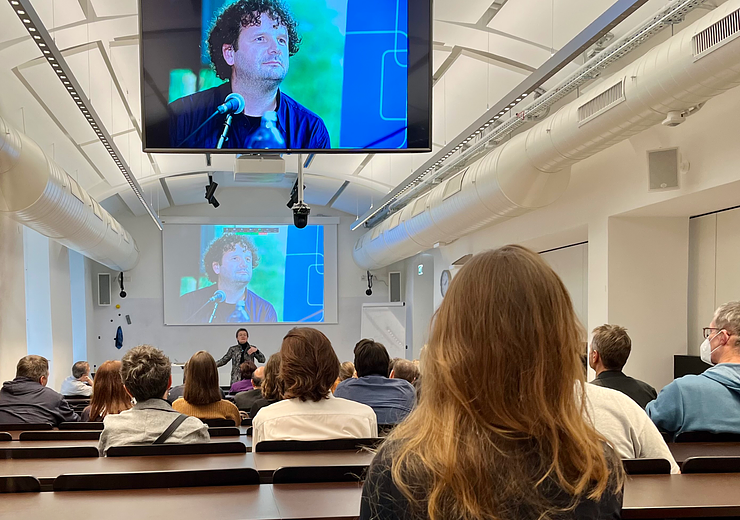Helmut Veith Lecture Hall Opening
We celebrated the legacy of Helmut Veith, brilliant computer scientist, colleague, and friend, with the opening of the Helmut Veith Lecture Hall.

On December 15, 2023, TU Wien Informatics honored the memory of the distinguished computer scientist Helmut Veith by celebrating his contributions to logic in computer science, computer-aided verification, software engineering, and computer security. From now on, the lecture hall “FAV 01” at Campus Favoritenstraße will bear the name “Helmut Veith Lecture Hall”.
Veith was a professor at our faculty and co-founder of the Vienna Center for Logic and Algorithms. Born in Vienna, Veith’s career was marked by significant contributions to computer science. His extensive publication record, numerous awards, and influential roles highlight his impact on the field. Veith’s commitment to education and mentorship, particularly his efforts to promote women in computer science, underscore his lasting legacy in the academic community. He passed away unexpectedly in March 2016.
Gerti Kappel, Dean of TU Wien Informatics, opened the event. “Helmut Veith has always gone the extra mile. He has done away with outdated approaches to informatics and changed the field not only as a researcher but as an activist. He is leaving a legacy that continues to inspire,” Dean Gerti Kappel honors her colleague. Georg Gottlob, Helmut Veith’s Ph.D. supervisor, shared insights into Veith’s early career, stating that “Helmut has never left us, until today we feel his influence. His intellectual prowess and curiosity, rigorous approach to research, and gift to build authentic relationships set the foundation for his remarkable contributions, for which we are thankful until this day.”
The opening of the lecture hall was accompanied by four talks encompassing Veith’s core research fields and academic principles: Somesh Jha talked about “Fearless Research or What I Learned from Helmut”; Johannes Kinder talked about “CEGAR for Regular Expression Semantics in JavaScript”; and Moshe Vardi concluded with a talk on “Model Checking Strategies from Synthesis over Finite Traces”.
Florian Zuleger, Orna Grumberg, Roderick Bloem, Anna Prianichnikova, Christian Fermüller, and Igor Konnov shared their heartfelt memories of their colleague, mentor, friend, and partner. Laura Kovács moderated the event.
About Helmut Veith
Born in Vienna, Helmut Veith began his career as a university assistant at TU Wien, rising to associate professor in 2001 and full professor in 2010. His academic tenure included impactful roles at TUM and TU Darmstadt. Veith’s profound contributions to computer science, spanning finite model theory, database theory, complexity theory, fuzzy logic, and model checking, are exemplified by his more than 150 published papers, five co-authored books, and significant recognition with more than 10,825 citations on Google Scholar. His most cited paper “Counterexample-Guided Abstraction Refinement” alone has been cited 2520 times, reflecting his monumental impact on the field.
Veith’s career has been marked by numerous awards, including the International Programming Award in 1989, the Austrian Presidential Dissertation Award in 1999, a Max Kade Fellowship, the ACM SIGSOFT Distinguished Paper Award, and a posthumous ERC Advanced Grant in 2016. His roles at prestigious institutions such as Carnegie Mellon, TUM, and TU Darmstadt, and his pivotal contributions upon returning to Vienna, particularly in strengthening Austrian research in computer-aided verification, underscore his impact. Veith was instrumental in high-profile projects and conferences, such as the Vienna Summer of Logic 2014 and the founding of the Vienna Center for Logic and Algorithms.
He was also a dedicated full member of the Wolfgang Pauli Institute. The WPI participates in the “Helmut Veith scholarships” for female masters students in informatics organized by VCLA and co-funded by TU Wien.
Veith’s passion for education was unparalleled, evident in his creation of new programs, influencing curricula, and his commitment to mentoring, especially the promotion of young talent and women in computer science. As a member of several academic committees, he played a key role in fostering international collaborations. Veith’s collaborative nature and dedication to improving academic standards made significant contributions to his field and left a lasting legacy in the academic community at large.
Curious about our other news? Subscribe to our news feed, calendar, or newsletter, or follow us on social media.
Note: This is one of the thousands of items we imported from the old website. We’re in the process of reviewing each and every one, but if you notice something strange about this particular one, please let us know. — Thanks!




